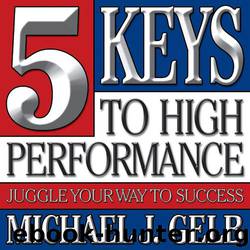The 5 Keys to High Performance: Juggle Your Way to Success by Michael J. Gelb

Author:Michael J. Gelb [GELB, MICHAEL J.]
Language: eng
Format: epub
ISBN: 9781596595477
Publisher: Gildan Media Corp.
Published: 2010-04-15T00:00:00+00:00
Who can learn faster, you or a baby?
Play is the exultation of the possible.
Philosopher, Martin Buber
Like most adults you’d probably answer the above question with:
“Babies are better, faster learners.” It is possible, however, for you, the adult learner, to learn even faster than a baby. You can learn faster than a baby if you are willing to combine a baby-like playfulness with your adult cognitive skills and resources.
Take language learning for example. Most people believe that a baby will learn languages far more rapidly than a 50-year old adult. Actually, the 50-year old can learn languages faster than the baby, if that adult learns as a baby does.
Traditional language learning programs were based on an overly analytical approach. Students memorized verb conjugations and vocabulary words. It didn’t work very well. Today the most effective language learning programs involve students in a total experience that emphasizes action and participation more than theory.
For example, in an Accelerated Learning Spanish class, students dress in sombreros and serapes. The walls are covered with colorful posters of Spain, Mexico and other Spanish-speaking countries. Spanish music is playing in the background. The students are acting out a scene using only Spanish. When a mistake is made, the teacher simply repeats the correct word, phrase, or pronunciation, which the student then repeats. Emphasis is placed on expressive gesture and body language. The teacher regularly “catches her students doing something right.” The room is filled with animation and laughter. This playful approach to learning isn’t just more fun; it’s much faster and more effective.
When meeting an accomplished juggler, people often ask: “Were you raised in a circus family? Were your parents professional jugglers?”
The assumption underlying this question is that one can only acquire such a skill during childhood. This assumption is almost right: One can only master such a skill by approaching it with the openness and enthusiasm of a child. It is the approach of a child that makes the learning possible.
What are the elements of the child’s approach and how can you apply them to unleash your full learning power?
• Curiosity
From birth, and some would argue, even before, the baby’s every sense is involved in exploring its world. The first years of life are characterized by a seemingly unquenchable thirst for knowledge. As soon as they can speak, children start asking questions: Why? Where? Who? When? What? How? The answers provide new data that form the basis for even more questions. An inquisitive child can take the most educated adult to the boundaries of knowledge with a few simple questions.
Curiosity- the desire to know, understand and explore- is the driving force of our natural learning mode of play. You can awaken and develop the power of play by asking questions and reaching beyond the answers with more questions. Leonardo da Vinci was, like most healthy children, insatiably curious. His curiosity was so strong that he wouldn’t take “Yes” for an answer. When Nobel-Prize winner Richard Feynman was a child his parent’s nurtured his genius by asking
Download
This site does not store any files on its server. We only index and link to content provided by other sites. Please contact the content providers to delete copyright contents if any and email us, we'll remove relevant links or contents immediately.
Tools of Titans by Timothy Ferriss(8365)
Change Your Questions, Change Your Life by Marilee Adams(7759)
Deep Work by Cal Newport(7064)
Playing to Win_ How Strategy Really Works by A.G. Lafley & Roger L. Martin(6237)
Man-made Catastrophes and Risk Information Concealment by Dmitry Chernov & Didier Sornette(6005)
Big Magic: Creative Living Beyond Fear by Elizabeth Gilbert(5754)
Digital Minimalism by Cal Newport;(5749)
Ego Is the Enemy by Ryan Holiday(5413)
The Slight Edge by Jeff Olson(5410)
The Motivation Myth by Jeff Haden(5204)
The Laws of Human Nature by Robert Greene(5172)
Stone's Rules by Roger Stone(5081)
Tuesdays with Morrie by Mitch Albom(4769)
Eat That Frog! by Brian Tracy(4525)
Rising Strong by Brene Brown(4450)
Skin in the Game by Nassim Nicholas Taleb(4239)
The Money Culture by Michael Lewis(4198)
Bullshit Jobs by David Graeber(4179)
Skin in the Game: Hidden Asymmetries in Daily Life by Nassim Nicholas Taleb(3989)
